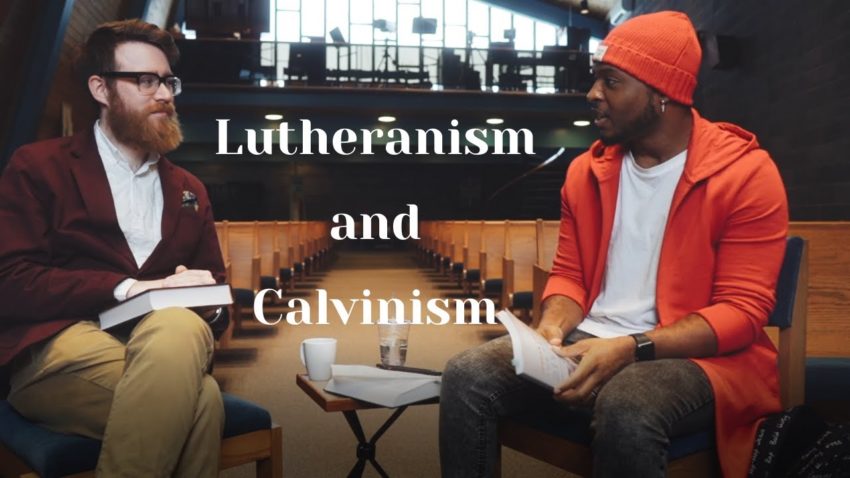I want to begin with a direct quote from Dr. Jordan Cooper at the 56:46 mark.
“And I think this is the thing about Calvinism, what’s appealing about it, is that it is a very logically consistent system. It is very logically consistent with itself. It answers a lot of questions. I like questions. And I like answers to questions even more. So, its appealing in that way. I like to have answers. And Calvinism does give those answers and all of the 5 points flow very well together. And you’ve got this idea of a covenant of redemption in eternity past that even starts the whole system. And its all so logical all the way through. But its not Scriptural.”
~ Dr. Jordan Cooper (from a discussion with Flame via YouTube)
While there were definitely parts of the discussion (approximately 1.5 hours) that I found helpful and encouraging, there were those points that left me somewhat confused as well. The title of the video (see above) is rather misleading as well. Rather than hearing a discussion of Flame’s song titled Extra Nos, it turned out the video’s focus was on two men who left Calvinism for Lutheranism. And in that context, it seemed strange to focus in on an attempt to poke holes in the doctrine of the perseverance of the Saints (Matthew 7; 2 Corinthians 13:5; 1 John 1).
Though I didn’t find their arguments against the P in TULIP convincing, what was more unconvincing was Dr. Cooper’s statement I cited above. After spending more than one minute commending the ‘logic’ of Calvinism, he says, “But its not Scriptural.”
When Flame moments before this segment had briefly commended solid exegesis and hermeneutical principles like allowing the clear texts to shed light on the unclear, we have this assertion with no Scriptural backbone to it. Why not address some of the clear passages which speak to this doctrine, Dr. Cooper?
And we know that for those who love God all things work together for good, for those who are called according to his purpose. For those whom he foreknew he also predestined to be conformed to the image of his Son, in order that he might be the firstborn among many brothers. And those whom he predestined he also called, and those whom he called he also justified, and those whom he justified he also glorified.
Romans 8:28-30
All that the Father gives me will come to me, and whoever comes to me I will never cast out. For I have come down from heaven, not to do my own will but the will of him who sent me. And this is the will of him who sent me, that I should lose nothing of all that he has given me, but raise it up on the last day.
John 6:37-39
And I am sure of this, that he who began a good work in you will bring it to completion at the day of Jesus Christ.
Philippians 1:6
“Simon, Simon, behold, Satan demanded to have you, that he might sift you like wheat, but I have prayed for you that your faith may not fail. And when you have turned again, strengthen your brothers.”
Luke 22:31-32
In him you also, when you heard the word of truth, the gospel of your salvation, and believed in him, were sealed with the promised Holy Spirit, who is the guarantee of our inheritance until we acquire possession of it, to the praise of his glory.
Ephesians 1:13-14
My sheep hear my voice, and I know them, and they follow me. I give them eternal life, and they will never perish, and no one will snatch them out of my hand. My Father, who has given them to me, is greater than all, and no one is able to snatch them out of the Father’s hand. I and the Father are one.”
John 10:27-30
Consequently, he is able to save to the uttermost those who draw near to God through him, since he always lives to make intercession for them.
Hebrews 7:25
Why not talk about the role of Christ’s intercession as our High Priest and how that pertains to the discussion of the perseverance of the Saints. Why not consider the discussion from the angle of God preserving His Saints (my preferred moniker for the P in TULIP). Why not address texts that are more critical to the discussion in the first place?
I think the Canons Dort would be worth discussing as it is a concise statement refuting the concept of Saints being able to fall away from the faith.
FIRST HEAD: PARAGRAPH 6. Who teach: That not every election unto salvation is unchangeable, but that some of the elect, any decree of God notwithstanding, can yet perish and do indeed perish.
The Canons of Dort (November 13, 1618—May 9, 1619)
By this gross error they make God be changeable, and destroy the comfort which the godly obtain out of the firmness of their election, and contradict the Holy Scripture, which teaches that the elect can not be led astray (Matt 24:24), that Christ does not lose those whom the Father gave him (John 6:39), and that God also glorified those whom he foreordained, called, and justified (Rom 8:30).
I am hopeful Dr. Jordan Cooper will follow up with a video addressing some of these texts. He is obviously a well read and educated man. Coming out of Calvinism, I would hope he would have a firm grasp on these texts and thus have the ability to fairly represent the ‘logical’ and Calvinistic interpretation.

